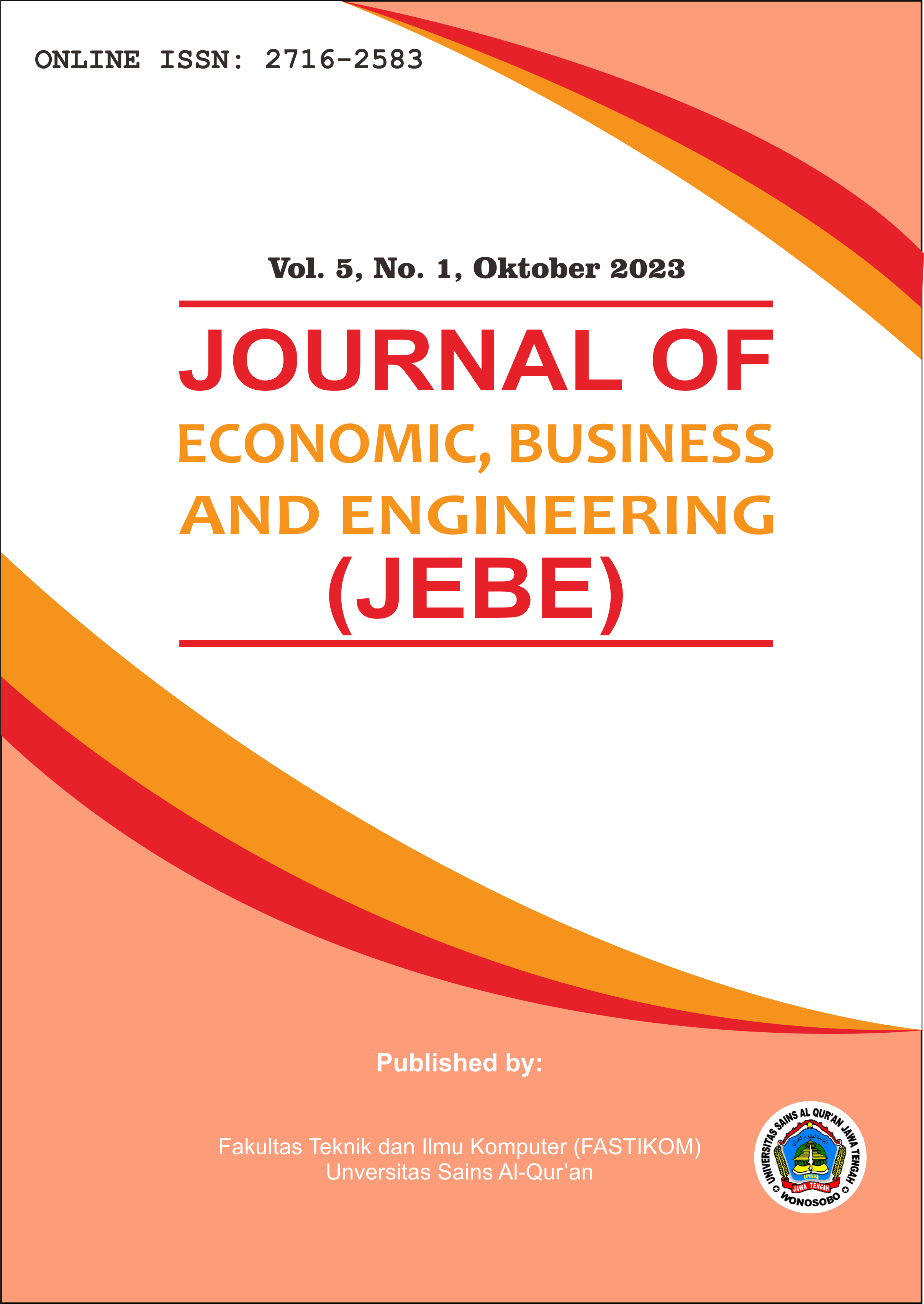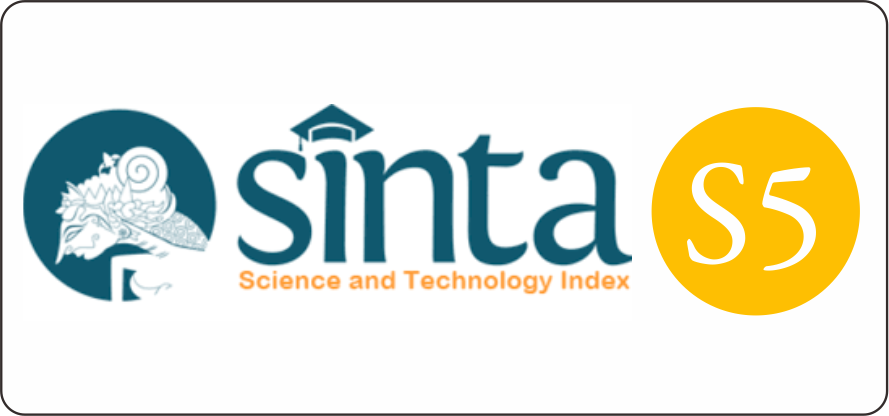PENGARUH EMPOWERING LEADERSHIP TERHADAP AFFECTIVE ORGANIZATIONAL COMMITMENT DAN KNOWLEDGE SHARING PADA INNOVATIVE WORK BEHAVIOR
DOI:
https://doi.org/10.32500/jebe.v5i1.5641Keywords:
Empowering leadership, knowledge sharing, psychological capital, affective organizational commitment, innovative work behaviorAbstract
Penting membangun perilaku knowledge sharing diantara karyawan, pengetahuan yang dihasilkan sebagai pembelajaran mereka untuk dapat dimodifikasikan kembali menjadi ide maupun cara kerja baru demi meningkatkan kinerja. Untuk itu, tujuan penelitian ini apakah terdapat pengaruh empowering leadership pada psychological capital, affective organizational commitment dan knowledge sharing seta bagaimana dampaknya pada innovative work behavior karyawan industri manufacture diwilayah Jabodetabek. Penelitian dilakukan pada Oktober 2022 hingga Juni 2023 dengan menyebar kuesioner kepada 200 karyawan industri manufacture di DKI Jakarta. Structural Equation Model (SEM) digunakan untuk menganalisis menguji hubungan antar variabel. Kesimpulan penelitian membuktikan empowering leadership masing-masing berpengaruh langsung terhadap knowledge sharing, psychological capital dan affective organizational commitment. Kemudian, psychological capital dan affective organizational commitment berpengaruh langsung terhadap knowledge sharing serta ditemukan hubungan langsung antara knowledge sharing terhadap innovative work behavior karayawan di industri manufacture.
References
Ariyanti, A. F., & Syah, T. Y. R. (2022). The Effect of Job Crafting on Work Engagement on Working Students. Budapest International Research and Critics Institute. Vol. 5 (2). Pp. 9000-9011. DOI: https://doi.org/10.33258/birci.v5i2.4687
Astuti, W., & Amalia, L. (2021). The Relationship between Work Motivation, Job Satisfaction, and Employee Performance: The Moderating Role of Psychology Capital and The Mediating Role of Organizational Commitment. Jurnal Manajemen Teori dan Terapan. Vol. 14(2). doi:10.20473/jmtt.v14i2.26192
Bakker, A. B., & Demerouti, E. (2016). Job demands–Resources Theory: Taking stock and Looking Forward. Journal of Occupational Health Psychology. Vol. 22. pp. 273–285.
Bhatti, M. H., Akram, U., Bhatti, M. H., Riaz, T., & Syed, N. (2022). Knowledge has no value until it is shared: an empowering leadership perceptive. International Journal of Quality and Service Sciences. Vol. 14. No. 1. pp. 133-153. https://doi.org/10.1108/IJQSS-04-2021-0064
Cusí, P. F., Zegheru, M. E., & Sellens, J. T. (2020). Linking Perceived Organizational Support, Affective Commitment, and Knowledge Sharing with Prosocial Organizational Behavior of Altruism and Civic Virtue. Sustainability. Vol. 12(24). 10289. doi:10.3390/su122410289.
Diyanto, A., Susanti, E., & Syah, T. Y. R. (2019). The Employee Innovation Intervening Role on Relationship between Work Engagement and Employee Performance. Science, Engineering and Social Science. Vol. 3(5). ISSN/e-ISSN: 2541 – 0369/2613 – 988X
Fransisca, I. W., Anindita, R., & Hilmy, M. R. (2021). The Importance of Knowledge Management for Improving Work Engagement of Professional Caregivers During Covid-19 Pandemic: A Study Path Analysis. International Journal of Nursing and Health Services (IJNHS), Volume 4, Issue 6. http://doi.org/10.35654/ijnhs.v4i6.536.
Hair, J. F., Black, W. C., Babin, B. J., & Anderson, R. E. (2014). Multivariate Data Analysis. Exploratory Data Analysis in Business and Economics. USA: Prentice Hall International.
Hendryadi, Suratna, Suryani, & Purwanto, B. (2019). Bureaucratic culture, empowering leadership, affective commitment, and knowledge sharing behavior in Indonesian government public services. Cogent Business & Management. Vol. 6(1). doi:10.1080/23311975.2019.1680099.
Hijawi, G., Moflih, M., & Almetramii, R. (2021). The Mediating Role of Knowledge Sharing Through the Relationship between Psychological Capital and Job Performance. Interciencia Journal. ISSN 0378-1844
Huang, G., Zhang, Y., Zhang, X., & Long, L. (2020). Job Insecurity, commitment and proactivity towards the organization and one’s career: Age as a condition. Hum. Resour. Management Journal.doi: 1748 8583.12322.
Janssen, O. (2004). How fairness perceptions make innovative behavior more or less stressful. Journal of Organizational Behavior. Vol. 25 (2). pp. 201-215.
Kim, M., & Beehr, T. A. (2018). Empowering leadership: leading people to be present through affective organizational commitment. The International Journal of Human Resource Management. Vol. 1(25). doi:10.1080/09585192.2018.1424017
Kim, I., & Beehr, T. A., (2019). The power of empowering leadership: allowing and encouraging followers to take charge of their own jobs. The International Journal of Human Resource Management. doi: 10.1080/09585192.2019.1657166
Kozhakhmet, S., Jayasingam, S., Majeed, N., & Jamshed, S. (2020). When investment in employee development promotes knowledge sharing behavior in an uncertain post-Soviet context. Personnel Review. Vol. 49(2). pp. 370-388. https://doi.org/10.1108/PR-12-2018-0523
Limon, İ. (2022). The relationship between empowering leadership and teachers’ job performance: Organizational commitment as a mediator. Journal of Theoretical Educational Science. Vol. 15(1). pp.16-41. http://doi.org/10.30831/akukeg.945201.
Lu, X. J. & Zhang, G. L. (2007). The relationship between work motivation and individual innovation behavior. Soft Science. Vol. 21 (6). pp. 124-127.
Maitlo, A. A., Memon, S. S., & Syed, S. (2019). Influence of Psychological Capital on Knowledge Sharing Behaviour in Research Fellows of Public Sector Universities. Journal of Business Strategies. Vol. 11(2). pp 1–20
Meyer, J. P., Stanley, D. J., Herscovitch, L., & Topolnytsky, L. (2002). Affec¬tive, continuance, and normative commitment to the organization: A meta-analysis of antecedents, correlates, and consequences. Jour¬nal of Vocational Behavior, 61(1), 20-52. doi:10.1006/jvbe.2001.1842.
Ouakouak, M. L., & Ouedraogo, N. (2018). Fostering knowledge sharing and knowledge utilization: The impact of organizational commitment and trust. Business Process Management Journal. Vol. 25(4). pp. 757-779. https://doi.org/10.1108/BPMJ-05-2017-0107
Park, G. J., Kim, S. J., Yoon, S. W., & Joo, B. K. (2017). The effects of empowering leadership on psychological well-being and job engagement: The mediating role of psychological capital. Leadership & Organization Development Journal. Vol. 38(3). pp. 350-367. https://doi.org/10.1108/LODJ-08-2015-0182.
Pian, Q. Y., Jin, H., & Li, H. (2019). Linking knowledge sharing to innovative behavior: the moderating role of collectivism. Journal of Knowledge Management. Vol. 23 (8). pp. 1652-1672. https://doi.org/10.1108/JKM-12-2018-0753
Qiu, X., Yan, X., & Lv, Y. (2015). The effect of psychological capital and knowledge sharing on innovation performance for professional technical employees. Journal of Service Science and Management. Vol. 8(04). Pp. 545.
Rasdi, R. M., & Tangaraja, G. (2022). Knowledge-sharing behaviour in public service organisations: determinants and the roles of affective commitment and normative commitment. European Journal of Training and Development. Vol. 46 No. 3/4. pp. 337-355. https://doi.org/10.1108/EJTD-02-2020-0028
Setiadi, Y., Indradewa, R., & Syah, T. Y. R. 2020. Transformational Leadership, Organizational Climate, Job Satisfaction on Team Performance over Retail Store. Science, Engineering and Social Science Series. Vol. 4(6). ISSN/e-ISSN: 2541 – 0369/2613
Snyder, C. R. (2002). Hope Theory: Rainbows in the Mind. Psychological Inquiry: An International Journal for the Advancement of Psychological Theory. Vol.13(4). pp. 249-275. DOI: 10.1207/S15327965PLI1304_01.
Vandavasi, R. K. K., McConville, D. C., Uen, J. F., & Yepuru, P. (2019). Knowledge sharing, shared leadership and innovative behaviour: a cross-level analysis. International Journal of Manpower. Vol. 41. No. 8. pp. 1221-1233. https://doi.org/10.1108/IJM-04-2019-0180
Wu, C. M., & Chen, T. J. (2015). Psychological contract fulfillment in the hotel workplace: Empowering leadership, knowledge exchange, and service performance. International Journal of Hospitality Management. Vol. 48, pp. 27-38.
Wu, W. L., & Lee, Y. C. (2017). Empowering group leaders encourages knowledge sharing: integrating the social exchange theory and positive organizational behavior perspective. Journal of Knowledge Management. Vol. 21(2). pp.474-491. https://doi.org/10.1108/JKM-08-2016-0318.
Yepes, V., & Lopez, S. (2023). The Knowledge Sharing Capability in Innovative Behavior: A SEM Approach from Graduate Students’ Insights. International Journal of Environmental Research and Public Health. Vol. 20. 1284. https:// doi.org/10.3390/ijerph20021284
Zhang, J., & Su, W. (2020). Linking Leader Humor To Employee Innovative Behavior: The Roles of Work Engagement and Supervisor’s Organizational Embodiment. Frontiers in Psychology. pp. 1–11. https://doi.org/10.3389/fpsyg.2020.592999







